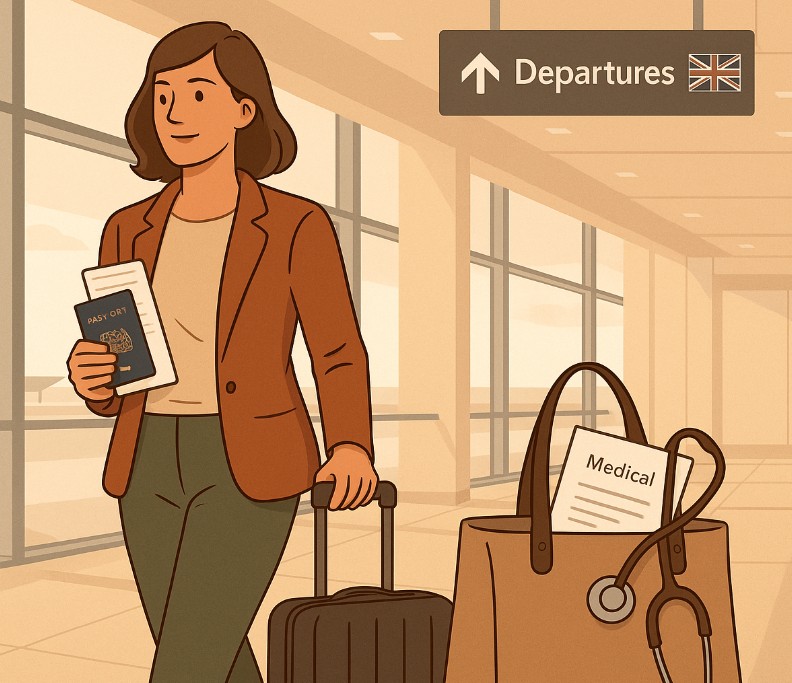Travel Insurance for Undiagnosed Medical Conditions UK: Your Essential Guide to Safer Journeys

Traveling with health concerns can be daunting, especially when those concerns remain undiagnosed. Whether you’re awaiting test results or under investigation for symptoms, finding suitable travel insurance becomes a top priority. In the UK, travel insurance for undiagnosed medical conditions is a complex but manageable matter, with the right knowledge. This guide unpacks everything you need to know, from how insurers treat undiagnosed conditions, to how you can secure coverage that protects your peace of mind on your trip.
What Are Undiagnosed Medical Conditions?

An undiagnosed medical condition refers to any symptom, illness, or ongoing health issue for which you have consulted a medical professional but have not yet received a confirmed diagnosis. This may include:
-
Awaiting test results
-
Experiencing unexplained symptoms
-
Being on a waiting list for treatment or referral
-
Having a referral to a specialist pending
Even if the cause of your health concern isn’t known yet, most travel insurers will treat undiagnosed conditions as pre-existing, and often decline coverage unless handled carefully.
Why Is Travel Insurance More Complicated in These Cases?
Insurance companies assess risk. Undiagnosed symptoms mean uncertain risk, and that makes insurers cautious. If your condition flares up during travel, or you require emergency medical treatment, the insurer may be faced with costs they couldn’t evaluate properly at the time of policy issuance.
That’s why most insurers either:
-
Exclude undiagnosed conditions from coverage
-
Decline the entire policy application
-
Provide limited cover with significant exclusions
But there are specialist policies available that offer peace of mind, even for travellers in medical limbo.
The Risks of Travelling Without Disclosure
Failing to disclose medical issues — diagnosed or not — can invalidate your travel insurance entirely. This means any medical expenses or cancellations related to that condition (or even indirectly connected) will not be covered. Even if your trip seems straightforward, emergencies abroad can be emotionally and financially devastating without proper coverage. Always be honest and transparent about your health when applying for travel insurance.
Can You Get Travel Insurance in the UK with an Undiagnosed Condition?
Yes — but not from every provider. The key is understanding how insurers evaluate undiagnosed conditions and knowing which types of policies to consider.
Some insurers may allow coverage if:
-
You’re awaiting a non-critical test or follow-up
-
Your GP confirms that you are fit to travel
-
Your condition has not required emergency treatment recently
-
The symptoms are minor and under control
Others will offer limited coverage that excludes claims related to your undiagnosed condition.
What to Look for in a Travel Insurance Policy
When searching for travel insurance with an undiagnosed condition, keep these points in mind:
Medical Screening Process
Many insurers will conduct a detailed questionnaire to assess your current health. Be prepared to provide:
-
Dates of GP or specialist visits
-
Types of symptoms
-
Medications prescribed
-
Pending appointments or test dates
Fit-to-Travel Declaration
A letter from your doctor confirming you are well enough to travel may be required. This can strengthen your application and reduce the risk of claim rejection.
Exclusion Clauses
Check for any clauses that explicitly exclude claims related to your symptoms or ongoing investigations. Understand clearly what is and isn’t covered.
Emergency Medical Cover
Even if your undiagnosed condition isn’t covered, your policy should still include emergency treatment, hospitalisation, and repatriation for unrelated issues.
Cancellation and Curtailment Protection
If your undiagnosed symptoms worsen before your trip and you need to cancel, you want to know whether you’re protected. Many policies won’t cover cancellations due to undiagnosed conditions, so read the fine print carefully.
Questions to Ask Before Purchasing a Policy
-
Will this policy cover me if I need emergency treatment unrelated to my undiagnosed condition?
-
If my symptoms worsen during travel, what is excluded?
-
Will I be covered if the undiagnosed condition turns out to be serious?
-
Is a fit-to-fly note from my GP required?
-
What is the claims process in such cases?
These questions will help clarify whether the insurance you’re considering is suitable or if you need to look elsewhere.
Who Should You Contact?
While we’re not naming companies here, look for UK insurers who specialise in pre-existing conditions or high-risk coverage. These providers often have trained staff to understand medical complexity and provide case-by-case assessments. It’s also wise to speak directly to an insurance broker. They can recommend policies tailored to your specific situation, especially if you’re struggling to find a suitable option on comparison websites.
The Importance of Timing
If you’re awaiting test results or referrals, you might be tempted to wait until a diagnosis is confirmed before buying insurance. However, this can be risky. The closer you get to your travel date, the more expensive and limited your options become.
Instead:
-
Disclose all current information at the time of purchase
-
Update your insurer if your condition is diagnosed before your trip
-
Ask if your policy allows adjustments before departure
Some insurers will amend the policy (or re-evaluate the medical coverage) if your situation becomes clearer.
Common Scenarios and What to Expect
Scenario 1: Awaiting a Blood Test
If the test is for routine purposes and you have no severe symptoms, some insurers may still offer full coverage, while excluding conditions related to the test.
Scenario 2: Unexplained Chest Pain
In this case, most insurers will exclude any claims related to cardiovascular or respiratory conditions. You may need specialist coverage or a doctor’s confirmation that the symptoms are minor.
Scenario 3: Referred to a Specialist
Even if you feel fine, this referral makes most standard insurers nervous. You’ll likely face exclusions or denials without specialist insurance.
Practical Tips Before You Travel
-
Get a GP letter stating you’re fit to travel
-
Bring enough medication for the full trip (plus extra)
-
Carry a copy of all medical records or recent test results
-
Know the emergency contact number for your insurer
-
Travel with someone who is aware of your medical situation
These precautions won’t just support your insurance application — they will also ensure a safer, more confident travel experience.
What If Your Condition Gets Diagnosed Before the Trip?
If a diagnosis is confirmed before your departure, notify your insurer immediately. They may:
-
Reassess your application
-
Adjust your premium or coverage
-
Refuse to cover certain aspects
-
Cancel and refund your policy (in some cases)
Early communication is critical to avoid unexpected rejections during a claim.
Can You Travel Without Declaring Your Symptoms?
Technically, yes — but it’s not advisable. If you need medical help abroad, and the insurer links the issue to your pre-travel symptoms, they can:
-
Reject your claim
-
Cancel your policy
-
Leave you with large out-of-pocket expenses
It’s always better to be upfront and protected, rather than take the risk.
Conclusion
Securing travel insurance for undiagnosed medical conditions in the UK requires preparation, honesty, and persistence. While many mainstream providers may turn you away, there are insurers and brokers who understand the grey area of undiagnosed health issues.
The key is to fully disclose your situation, understand the exclusions, and obtain any necessary medical clearance. That way, you can travel with confidence — knowing you’re backed by a policy that works for you.
Don’t let medical uncertainty stop your journey — secure smart travel insurance today.



